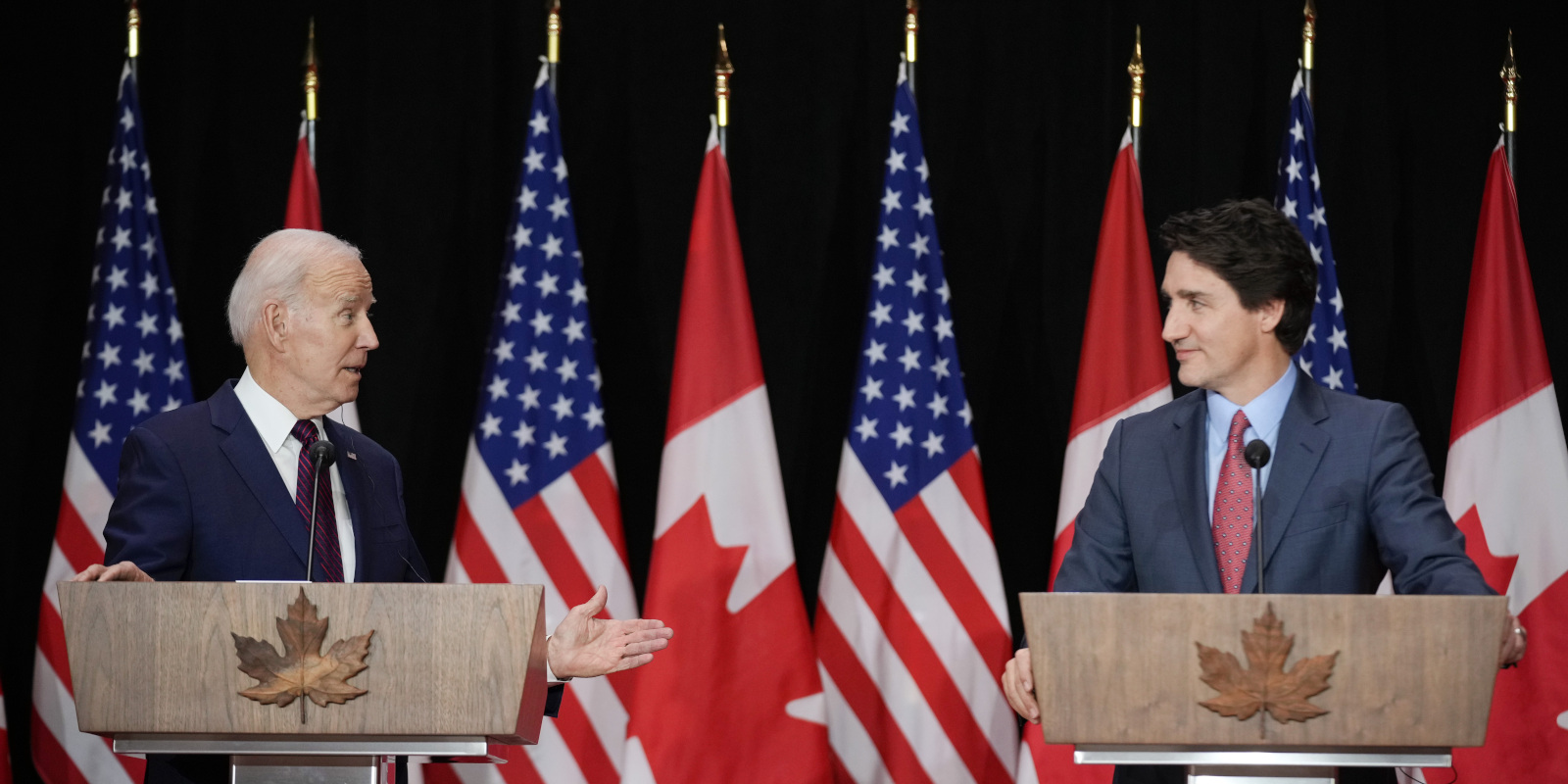A lot can change in seven years. Joe Biden’s sleepover in Ottawa last week was the first state visit by a sitting U.S. president since June 2016, when Prime Minister Justin Trudeau hosted Barack Obama during the first year of his premiership.
Just a few months after Obama’s visit, Donald Trump won the 2016 U.S. election. Trump’s protectionist policies, including tariffs and ending America’s involvement in international trade treaties, upended a decades-long consensus on international free trade.
Many Canadians breathed a sigh of relief when Trump failed to win re-election in 2020, and was replaced by Biden. On matters of international trade, however, Canada and the U.S. have not returned to the status quo of 2016.
Trevor Tombe, a professor of economics at the University of Calgary and Hub contributor, says that since Trump became president, the U.S. has been less willing to engage with international institutions and trade, both courses of action that are popular with the U.S. public. A Gallup poll earlier this month suggested a record-low 65 percent of Americans want the U.S. holding a leading or major role in world affairs.
“It’s potentially not a partisan issue or a personality-driven issue, but something that’s an important component of U.S. public sentiment, in terms of how they view their place in the world, or the relative merits of international trade agreements,” says Tombe. “I wouldn’t put any kind of disproportionate burden on Biden’s shoulders in terms of changing the economic relationship between Canada and the U.S., not at all.”
Biden has not undone the protectionism that began in the Trump era. With a pandemic in early 2020, and then Russia’s invasion of Ukraine two years later, the global economy was further rocked by severely disrupted supply chains and a world re-polarized between democracies and authoritarian regimes like Russia and China.
Biden also killed the Keystone XL pipeline and introduced hundreds of billions in tax credits and subsidies on green projects to achieve “Net Zero” carbon emissions.
Canada itself has engaged in its own form of incentivizing green projects, with the federal and Ontario provincial governments spending a yet-undisclosed amount of money this year to ensure Volkswagen builds its electric vehicle battery plant in St. Thomas, Ontario. Estimates of the total cost range as high as $10 billion CAD, and the project has been received with a mixture of praise and skepticism surrounding the cost and benefits of the plant.
Candice Chow, a professor at McMaster University’s DeGroote School of Business, says the electric vehicle industry would have been an important topic during Biden’s visit.
“As the U.S. is seeking to bring jobs back, Canada needs to ensure with its vast natural resources, we do not become a country of commodity export, but secure our ability to take a leadership position in innovation and in green technology,” says Chow.
With the electric vehicle industry growing and requiring new spaces and capabilities, Chow says it’s natural to reshore the industry within Canada.

“Canada has the competitive advantage in mining for cobalt and has lithium deposits, completing a crucial aspect of (the) EV auto supply chain,” says Chow. “Our weather creates opportunities for us to build and develop better battery range. We have a healthy auto sector cluster with part suppliers, especially in Ontario, and multiple multinational enterprise auto brands already have facilities in various parts of the province (and) country.”
Chow says there are many reasons why certain industries are reshoring, including economic and political ones.
“We in general have allowed ourselves to become very heavily dependent on inexpensive Chinese manufactured goods,” says Aurel Braun, a professor of international relations and political science at the University of Toronto. “Now that we are seeing the conflict in Ukraine, now that we have seen the aggressiveness of China in the South China Sea, we will begin to realize that it is not only about economics, that politics are always a factor.”
Braun says that whether or not reshoring and the related trend of friendshoring (the reorienting of trade within democratic countries instead of dictatorships) are here to stay or are merely an interlude depends on what lessons are learned.
“This notion of free trade was not one that we really understood well, and we have been paying a very high cost for it,” says Braun. “We are finding that the Chinese would supply cheap goods, but then we became very dependent on them, and they will conduct industrial espionage and political interference.”
Recommended for You

Alberta and the notwithstanding clause: Why the province just used it, and why it was logical to do so

Canada is quickly becoming a country where your social media posts could land you in jail

This turbulent trade environment is a new reality, not a temporary storm

Is Alberta justified in using the notwithstanding clause to legislate teachers back to work?




